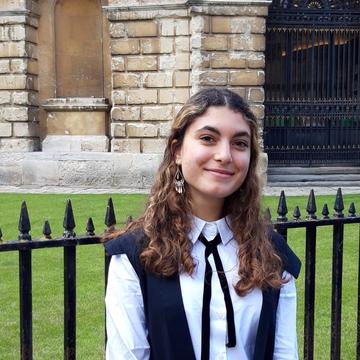there is no such thing as a “stupid question”. Tutorials are an open room for conversation and debate
Sara Al Soodi is a first-year undergraduate studying History at Christ Church College. She attended a state school and sixth form college in Hampshire. Prior to applying to Oxford, she took part in a History study day at St. John’s College and a personal statement workshop at Teddy Hall. Engaging with these outreach activities encouraged her to apply to read History at Oxford.

Prior to a tutorial, you are expected to complete a piece of work, usually an essay, or simply complete some reading in order to familiarise yourself with the topic. This will give you some background knowledge on the area of study you are covering that week, as well as a discussion starter for the tutorial itself. Therefore, it is crucial that you engage with as much of the reading list as you possibly can. There is no right or wrong amount of the reading list to cover, as the tutors do not expect you to read everything. It is up to you to decide how much you need to cover, and the tutors will often give you some suggestions on where to get started. Attaining a decent understanding of the subject will also come in handy.
The tutorial usually begins with a conversation about the essay you submit, including what you thought about it and the arguments you explored. It offers a chance to talk through your essay and explain your approach and thought process. Certain tutors may ask for the essay in advance (whether that is two days or the evening before the tutorial) whereas others ask you to bring it to the tutorial and read it out – this depends on each tutor’s style of teaching. Often tutorials are made up of 2-3 students alongside the professor, so points raised will be compared and debated between each other. This is not always the case however, and there may be times when it is a 1-to-1 discussion with your tutor.
Completing an essay helps open that discussion, which often flourishes into different topics based on what you covered in your studies that week. It is a mix of conversation with your tutor and fellow tutees, as well as an opportunity to take notes as they speak, filling out the gaps in your knowledge. Some tutorials will take the form of a conversation whereas others may consist of your tutor speaking for longer, so as to cover all the relevant information. As experts in their fields, it is a great chance to get the most from your tutor. While the tutors will ask you questions throughout, you are also able to direct questions to them, and there is no such thing as a “stupid question”. Tutorials are an open room for conversation and debate, and tutors will enjoy listening to new perspectives, as long as you are ready to back them up with your evidence.
Towards the end, you will have an opportunity to ask any remaining questions about the topic which has been discussed, or clear up anything that may have come up earlier in the tutorial. The tutorial usually concludes with your tutor giving you a brief overview of next week’s essay topic before sending you the details. This means you know what to expect for the next week of study and are able to ask any questions you might have before you get started.